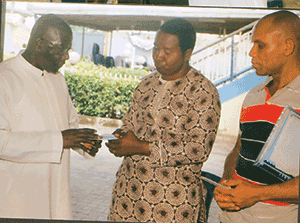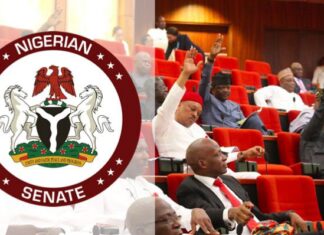JDPC, a non-profit and non-partisan organisation that ensures that justice and peace reigns among the citizenry, has resolved numerous cases that would have resulted in protracted legal battles in law courts. Senior Correspondent, JUDE KENNETH, recounts recent cases handled by the commission and its promotion and sustenance of human rights and dignity.

Justice Development and Peace Commission (JDPC) is a social organ of the Catholic Church, which was established by the late Pope Paul VI in 1967. The Pope established the Pontifical Council for Justice and Peace through which the church attends to issues relating to justice, peace, development and human rights.
In Nigeria, JDPC represents the ministry of service of the Catholic Church. It is aimed at promoting and sustaining human development through a holistic approach, with a focus on Gender and Women Empowerment, Conflict Resolution/Alternative Dispute Resolution, Human Rights, Legal Aid, Research and Policy Advocacy, Good Governance and Democracy, Micro Finance, Relief/Disaster and Emergency Aid, Training and Education for Development.
Mediation
Coordinator of JDPC of Our Lady of Lourdes Catholic Church, Coker, Orile-Iganmu, Lagos, Simon Peter, told TheNiche of a very recent case of child abuse by a woman at Amukoko, a Lagos suburb, which drew the attention of JDPC in the area. According to him, a girl (name withheld) of humble parentage was brought to her aunt from the village for upbringing. Surprisingly, instead of the aunt to register her in school, she subjected the girl to pathetic and inhuman treatment and occupied the girl of about 10 years old with endless domestic work.
Peter said that when the information got to JDPC, it intervened by inviting the woman, counselled and cautioned her against the ill-treatment on the girl. He said the Commission is still monitoring the situation and threatened to send the girl back to the village if the woman continues to maltreat her.
He, however, said that with the intervention of JDPC, the maltreatment of the girl has stopped, adding that it is one of the services of JDPC to the society.
JDPC is the voice of the voiceless; it fights for the unjust and marginalised people in the society, to ensure freedom and peace of every member of the society, Peter said.
The Commission in the Lagos Catholic Archdiocese has intervened and settled numerous cases involving landlords and tenants, husbands and wives, business associates, child torture, breach of contract, land cases, child maltreatment and wife battering.
JDPC intervened also in a case involving a landlord and his tenant at Coker. The tenant is a pastor and both are from Edo State.
The pastor was said to have used his money to renovate the building before he parked into the house and after the expiration of the period covered by the money he spent, he started paying rent until when he fell sick for over a year and could not meet up with payment of the rent. Consequently, he was given a short quit notice by the landlord. It was said that all the appeals made to the landlord fell on deaf ears.
Surprisingly, the landlord took the matter to court.
After JDPC’s efforts for amicable resolution of the matter with the landlord failed, the commission encouraged the pastor to attend the court and present his case. At the end of the case, the pastor won. He was given six months to look for alternative accommodation as against four months which he earlier pleaded with the landlord to give him.
According to Peter, JDPC has recently successfully disposed of about 10 cases, adding that the parties are happy. He, however, refused to disclose the identity of those involved.
Financial aid
JDPC assists financially, no matter how little the amount. As a non-profit organisation, its financial resources are limited.
Presently, one Iyke, who has health challenges, is getting assistance from JDPC Coker branch.
Suffering from partial stroke, partial blindness and difficulty in breathing, Iyke was taken to Lagos University Teaching Hospital (LUTH) for treatment. The commission is assisting him financially.
“We are looking into ways of referring him to society, like St. Vincent De Paul, for financial help. He is single, no job. We did a lot for him,” the JDPC coordinator disclosed.
Legal aid
Other areas which JDPC renders its services is provision of legal assistance. The commission has professionals in different fields, such as law; therefore the legal team assists the poor, downtrodden, those who cannot afford to pay fees for legal services to obtain justice.
In most cases, JDPC settles matters before they escalate. The commission gives idea, counselling and discourages people from going to conventional law courts because it involves money, and a lot of time is normally wasted before justice could be obtained.
Empowerment
The commission gives people six months computer training free of charge – thus empowering people who cannot pay for themselves.
Patrick, one of the beneficiaries, expressed gratitude to JDPC for sending him for six months computer course without him paying any fee. The commission was responsible throughout the period of his course.
“I benefited from the six months computer training. JDPC of Archdiocese of Lagos collaborated with the National Directorate of Employment (NDE) for empowerment scheme in 2010,” he said.
According to him, JDPC empowers people in computer training, bead making, opening of salon, fashion designing/tailoring, among others.
It is a matter of choice; any beneficiary can choose the course he/she wants to attend, he added.
Checks and monitoring
JDPC checkmates the excesses of law enforcement agencies, especially the police. It also monitors elections at all levels. It liaises with the Independent National Electoral Commission (INEC) and other government agencies to ensure free and fair polls.
However, in as much as JDPC checks the excesses of the police, the two also work together to ensure that justice and peace reign in the society.
“We continue to speak out against violation of human rights through press conferences, campaigns and flyers.
“JDPC comes in to settle disagreements. We advise parties and discourage them from going to court, but settle before going to court. To obtain justice is expensive. We discourage the parties, advice and resolve the issues without any charge,” Peter said.
No matter the financial status of the parties, he said,they will be given fair hearing; so that at the end of the matter, peace would reign.
Human resources
Bright Ago, a human rights activist and deanery coordinator of Apapa JDPC, said membership of the commission has no limitation, as it cuts across creed, race or ethnicity. It is open to male and female volunteers, especially professionals in social fields such as lawyers, journalists, teachers to mention a few.
JDPC operates with committees such as executive, human right, education, micro finance and welfare.
Members of JDPC, TheNiche gathered, are trained to be leaders; they must live by example and should not take law into their hands. They must be impartial in handling cases. They must abide by the slogan ‘Justice inside, Justice outside’ which implies that any member of JDPC must ensure that justice reigns at all times whether within or outside.
JDPC works to address the evils of our time in line with the teaching of the Catholic Church, to bring hope to the oppressed and practise love for neighbour.
Its work in respect of poverty, human development, democracy, and human rights draws directly upon the Church’s call for a charitable response by the people of God to the cry of the poor, the injured, and the vulnerable.
Distinctive factor
One significant factor that distinguishes JDPC from other civil society organisations is that it is practically into conflict resolution. It serves as an arbitrator; wades into issues or disagreements brought before it by any complainant.
Its team of professionals invites the aggrieved parties to a peace meeting, and after an amicable resolution of the disagreement, the parties are made to sign a memorandum of understanding while JDPC countersigns as witness/arbitrators.
The involvement of the Commission in dispute resolution shows the commitment and seriousness attached to justice and peace within the society.
JDPC’s practical participation in conflict resolution is in addition to seminars, workshops, campaigns and conferences which other civil society organisations carry out.
Ago, while corroborating Peter, said the vision of JDPC is to bring the Kingdom of God within the society in its entirety, liberating all people from every oppressive force that keeps them under bondage, irrespective of race, creed and gender.
According to him, JDPC creates forum for information gathering and dissemination as a community empowerment tool. It works with international agencies, government agencies and NGOs for integral development, poverty reduction and good governance.
It also helps to propagate and promote the social teaching of the Church as a way of contributing to the success of social transformation.
JDPC has waded and amicably resolved several issues and disagreements that would have resulted in loss of lives. One of such cases is land dispute between Fidelis Adimorah (complainant) from St. Kizito Catholic Church, Alaba Oro area of Ajegunle, and Alex Jideofor from St. Brigid Catholic Church, Ijeshatedo, both in Lagos State. While Adimora is the first buyer of the land, Jideofor is the second buyer of the same land from another party.
According to Ago, the matter has been in court for about five years; but when it was brought to the knowledge of JDPC, the matter was withdrawn from court, and within a very short period of mediation, nerves were calmed and the parties acceded to the terms reached.
At the end, Adimorah, who was the original buyer of the land, paid N5 million to Jideofor because of the structures he had already put on the land when the land was fraudulently sold to him. At the centre of the mediation team was Rev. Fr. Patrick Offin of St. Mary’s Catholic Church, Ajegunle, where the case was decided.
Ago noted that JDPC Lagos Archdiocese has achieved a lot in the area of conflict resolution, justice and peace, adding that if there is no justice, peace will not prevail; and if there is no peace, justice will elude the people.
Looking for justice and peace?
In the world’s most difficult and dangerous conflicts, local peace-makers like the JDPC are making a real difference. Every day, they risk their lives to make peace and nip conflict in the bud.
According to Wikipedia, “Justice, in its broadest context, includes both the attainment of that which is just and the philosophical discussion of that which is just. The concept of justice is based on numerous fields, and many differing viewpoints and perspectives, including the concepts of moral correctness based on ethics, rationality, law, religion, equity and fairness.
“Often, the general discussion of justice is divided into the realm of social justice as found in philosophy, theology and religion, and, procedural justice as found in the study and application of the law.”
Settlement or resolution of conflicts breeds peace, harmony and coexistence in the society. Other civil organisations should, therefore, join the JDPC in practical resolution of conflicts in addition to other social functions.











